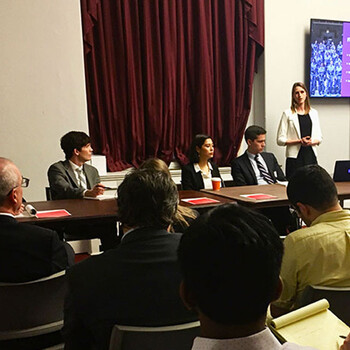Veterans Clinic Heads to Washington

This month, students in the Veterans Legal Services Clinic (VLSC) at Yale Law School traveled to Washington, D.C. for two days of events across multiple current matters.
On Monday, December 2, Arjun Mody ’20 presented oral argument before the U.S. Court of Appeals for the Federal Circuit in the case of Monk v. Wilkie, No. 19-1094. Lynn Neuner ’92, of co-counsel Simpson Thacher & Bartlett, also presented argument.
In 2017, after a prior generation of Clinic students had first argued in the same case, the Federal Circuit overturned nearly 30 years of precedent to hold that disabled veterans may aggregate their claims in class actions before the U.S. Court of Appeals for Veterans Claims. On remand, in 2018, the en banc Veterans Court divided 4-4 as to whether the class proposed in Monk — veterans who have waited one year or more for a decision on their administrative appeals — should be certified.
On December 2, the case returned to the Federal Circuit to consider whether the Veterans Court, in the first class-action ruling in its history, had properly interpreted the “commonality” requirement of Rule 23 of the Federal Rules of Civil Procedure. The proposed class includes approximately 470,000 veterans who wait, on average, six years for a decision on their appeal by the U.S. Department of Veterans Affairs (VA).
“Appallingly, one in 14 veterans die while waiting for a VA decision. While they wait, they are forced to go without critical disability compensation benefits to which they are often entitled,” explained Madison Needham ’21, a student working on the case. “Mr. Monk’s suit asks the Federal Circuit to clarify the law governing class actions moving forward, so that these veterans may collectively and meaningfully challenge these harmful VA delays.”
The team was joined in court by Conley Monk Jr., the first named plaintiff in the proposed class action. Monk is a longtime New Haven resident and Marine Corps combat veteran who served in the Vietnam War. In the decades following his service, he has become an advocate for his fellow veterans, primarily through his leadership in the National Veterans Council for Legal Redress, a Connecticut-based veteran service organization. “His commitment to advocating for veterans inspires us all, and it is an honor to represent him in Monk v. Wilkie,” said Jade Ford ’20, another student working on the case. Jesse Tripathi ’21 has also worked on the Monk litigation this term.

VLSC member Lauren Blazing ’21 spoke to House legislative staff about best practices for congressional nominations to military service academies.
The same day, other members of the Clinic presented a briefing to House legislative staff on best practices to advocate for equity in congressional nominations to the military service academies, in connection with the Clinic’s representation of the Connecticut Veterans Legal Center (CVLC).
The trip follows the release of a CVLC report this summer, authored by Clinic students and revealing that members of Congress nominate far more male students than female students to these prestigious, taxpayer-funded institutions. Research conducted by the Clinic found that congressional offices use different processes to recruit and select candidates, and that there are no standardized “best practices” for offices to follow.
“This unsystematic approach coupled with implicit bias, resource constraints, and barriers to entry have led to troubling gender imbalances in service academy nominations,” said Lauren Blazing ’21, a member of the Clinic.
Over the last few months, the Veterans Clinic has coordinated with members of the Connecticut delegation to gather feedback on the report and to generate a list of recommendations for more equitable nominating practices. The December 2 briefing, sponsored by Rep. Jackie Speier (D-CA) of the House Armed Services Committee, gave the Clinic the chance to share those recommendations with staffers and legislators.
“We hope to reveal the problem, provide tangible tools to encourage more equitable nominations, and start an iterative conversation with folks who are doing nominations work day in and day out,” Blazing said.
The briefing was conducted by Kath Xu ’20, James Campbell ’20, Lauren Blazing ’21, and Kyla Eastling ’21; Liam Brennan ’07, Executive Director of CVLC, also participated in the briefing.
On December 3, the U.S. Court of Federal Claims heard oral argument on motions to dismiss and for judgment on the administrative record by the U.S. Army in LaBonte v. United States.
The Clinic’s client is an Army veteran who served in Iraq in 2004. While in Iraq, he suffered a traumatic brain injury and developed PTSD. Despite clear evidence of his symptoms, the Army repeatedly failed to provide him with a medical examination or proper treatment, and his untreated conditions eventually led to his discharge from the Army. The Clinic has worked with this client since 2014, helping him secure a discharge upgrade in 2017 and VA benefits.
Now, students in the Clinic are working to have their client retroactively medically retired, on the ground that he was medically unfit to serve in 2004. In 2018, the Army Board for the Correction of Military Records denied the medical retirement claim on the merits, and the VLSC filed suit. Oral argument in the Court of Federal Claims focused on whether the court possessed jurisdiction over the claim for retroactive medical retirement and whether the Army’s rejection of the claim was arbitrary and capricious.
In a decision issued from the bench immediately after oral argument, Judge Richard Hertling held that the Court had jurisdiction over the medical retirement claim and that the medical opinion in the 2018 decision was contrary to law. Judge Hertling remanded the case for further proceedings. “The team looks forward to continuing to work to secure long-overdue benefits over the next few months,” said Clinic member Julia Coppelman ’20.
Sam Davis ’20 argued before the Court. Coppelman and John Super ’20 also worked on the case this term.


